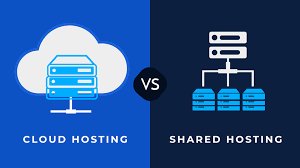Cloud Hosting Vs Shared Hosting: Compared to shared hosting, cloud hosting provides more flexibility and scalability. It also provides optimized performance for medium-size websites. This type of hosting is more expensive, but the advantages it offers can outweigh its drawbacks. It is ideal for small to medium-sized websites. However, you should consider several factors before making the switch. Here are some of the key differences between shared and cloud hosting.
Costlier
If you’re in the market for Cloud hosting, you’ve probably seen that some providers are more expensive than others. This is because they require you to pay for an upfront set-up cost, as well as recurring costs. You’ll also have to choose between different types of resources, as each has different pricing and quantity requirements. For example, Google charges different rates for bandwidth pipes. However, if your website is not very busy, you don’t necessarily need to buy more bandwidth than you need.
For the most basic sites, a traditional hosting company is probably better for your needs. While you may be able to get by with a shared server, a cloud hosting company’s servers are dedicated to your website. This means that they can handle sudden spikes in traffic much more easily. Plus, cloud hosting allows you to use innovative services like CDN, site replication, and automatic daily backups. In addition, you can choose from multiple servers that will run your website in different regions.
Scalability
Cloud hosting offers scalability on-demand and is ideal for growing companies and small organizations. Customers can add and remove resources according to their growth needs and pay only for what they actually use. Because cloud hosting is based on software, customers don’t have to invest in expensive hardware or manage software. Whether you need a few server resources to power a small blog or a massive database, cloud hosting can accommodate your needs.
With the right kind of infrastructure and a reliable cloud hosting provider, you can increase and decrease your computing resources as required. For example, if your site experiences a spike in traffic, you can easily add more resources and reduce the amount of computing resources you need. In addition to providing scalability, cloud hosting is secure. Because it’s hosted on multiple locations, you don’t have to worry about data breaches or theft of data.
Also Read: Can I Get Free WordPress Hosting?
Optimized performance
Optimum cloud performance requires different strategies and tools. While many companies approach cloud optimization in a silo-like manner, tackling it holistically requires more careful planning and implementation. Listed below are some of the different kinds of cloud optimization and their respective strategies. These techniques vary in cost and performance profile, but they all provide a number of benefits to organizations. These methods are a great way to achieve optimal performance.
Cloud management is a great way to maximize cloud visibility, uncover cost-saving opportunities, and optimize performance. However, cloud optimization is not a one-time deployment, but a continuous improvement process. It’s a type of Continuous Deployment, whereby developers make incremental improvements to specific areas of an application in the cloud. This process can drastically reduce costs and improve performance. However, cloud management processes can be cumbersome and require specialized skills.
Costlier for small to medium-sized sites
Most small-to-medium-sized websites can get away with spending as little as $10 a month for cloud hosting. Cloud hosting is also less likely to charge you the same amount every month. This means you will only pay for what you need. If your site has a low amount of traffic, you can get away with a B-series virtual machine. If your site experiences spikes in traffic, you can pay for a higher-end virtual machine.
Dedicated servers are also a good option if you have a high amount of traffic. These are not shared with other customers, and provide you with total control over your content. These servers are generally less expensive than on-premises physical servers, but they require more knowledge and experience to run. The least expensive dedicated server is a DCsv2-Type1 machine, which can support large news, entertainment, and media sites.

